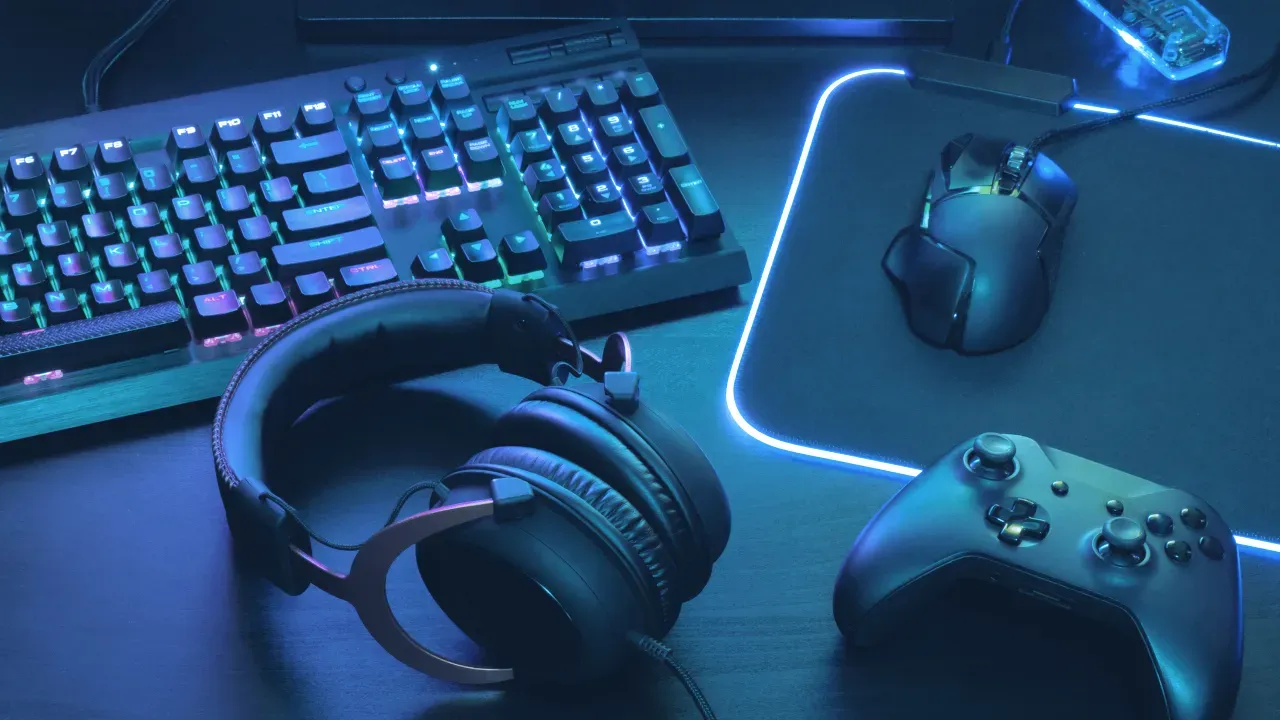In the ever-evolving landscape of gaming, a groundbreaking evolution is underway – the advent of blockchain games. These games, utilizing blockchain technology, are poised to redefine the gaming experience, offering unparalleled transparency and fairness between players and creators.
In this article, we explore the world of blockchain gaming, where web3, smart contracts, tokens, and decentralized autonomous organizations (DAOs) are redefining the traditional gaming landscape.
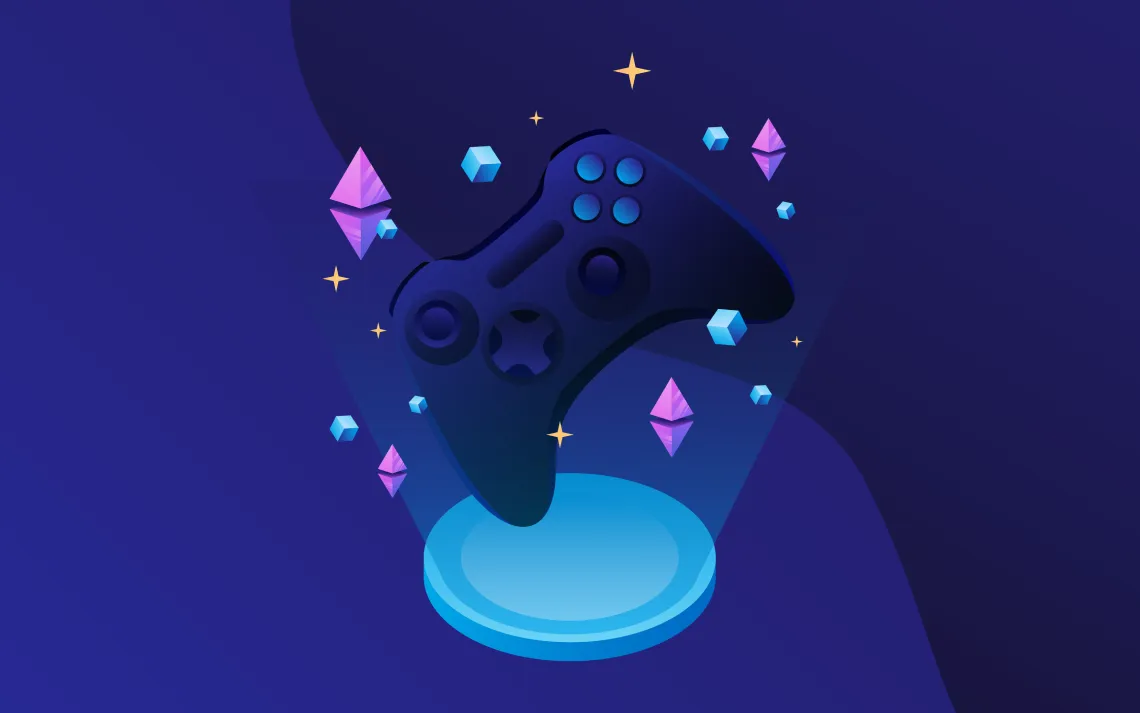
What is Blockchain Gaming?
"A blockchain game is any game that uses blockchain technology to enhance or rearchitect traditional video games."
At its core, a blockchain game is any game leveraging blockchain technology to innovate traditional video games. The intrinsic alignment between video games and web3 is evident; both exist in the digital realm, incorporating digital items and currencies with built-in gamification.
The key objective of blockchain games, spanning various genres, is to establish a fairer and more transparent relationship between players and game creators. The implementation of blockchain technology varies, offering degrees of enhancement within video games.
How Does Blockchain Gaming Work?
To better understand how blockchain gaming works and the benefits of blockchain games we will look at the tools available to gaming developers. Specifically, wallets, smart contracts, and tokens - all these items are built on top of blockchains.
(1) Wallets
Universal Player Identities
In the realm of traditional gaming systems and non-blockchain software, the prevalent feature is the enclosed login system. Players typically maintain distinct identities for each exclusive gaming platform they engage with, such as a Steam or Epic account.
While many gamers accept this as an unavoidable aspect of contemporary gaming, blockchain or crypto wallets introduce an alternative approach for gamers. In the context of blockchain-native digital worlds and the games developed atop them, blockchain wallets act as a singular entry pass. Gamers can create a single wallet, providing them access to a multitude of games.
It is important to acknowledge existing limitations within this universal pass model, particularly concerning connectivity issues between various blockchain ecosystems. Further elaboration on this matter will be discussed later.
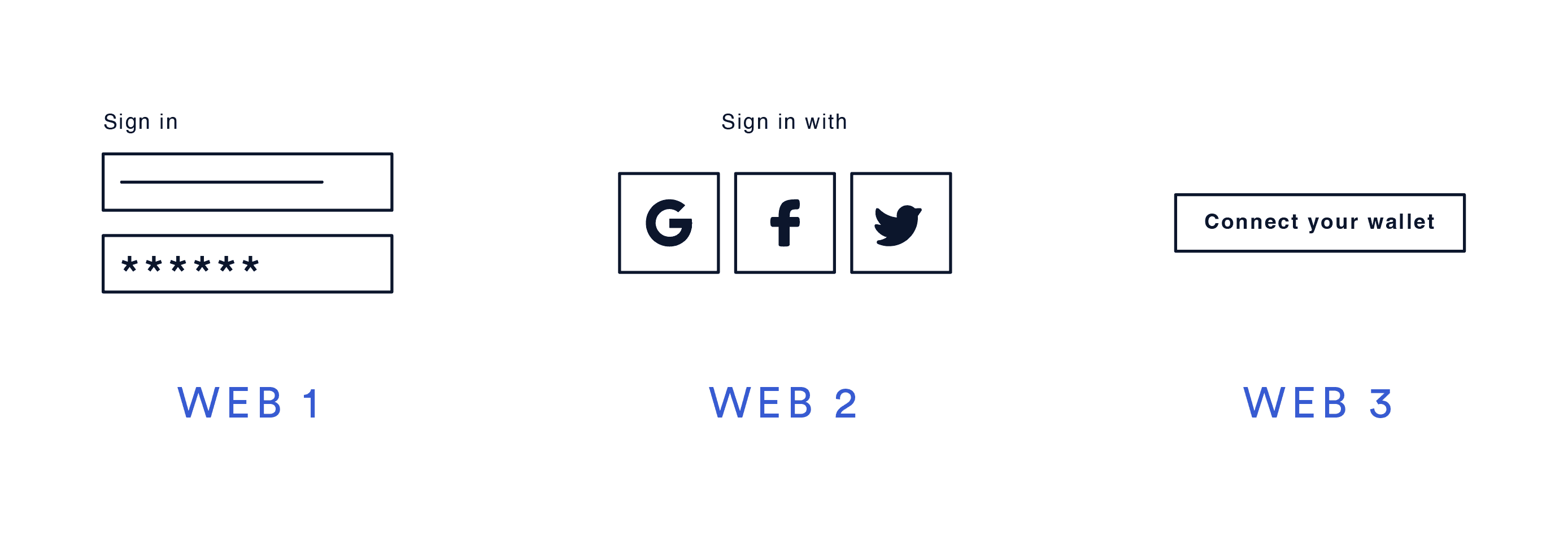
(2) Smart Contracts
Core Code
Smart contracts serve as the fundamental building blocks of all blockchain applications. These contracts operate automatically in a deterministic manner, offering gamers a trust-minimized assurance that the specified segment of the game encoded within these contracts will consistently unfold as intended.
Although the ultimate aim is to integrate smart contracts to govern the entirety of game logic, it's essential to recognize that contemporary blockchain games adopt a hybrid architecture. This approach combines both on-chain code (smart contracts) and off-chain code to address speed and scalability challenges.
Currently, smart contracts in blockchain games predominantly facilitate the creation and transfer of in-game items and currencies. Additionally, they play a role in securing crucial in-game functions, such as determining the outcomes of specific rounds or matches within the game.
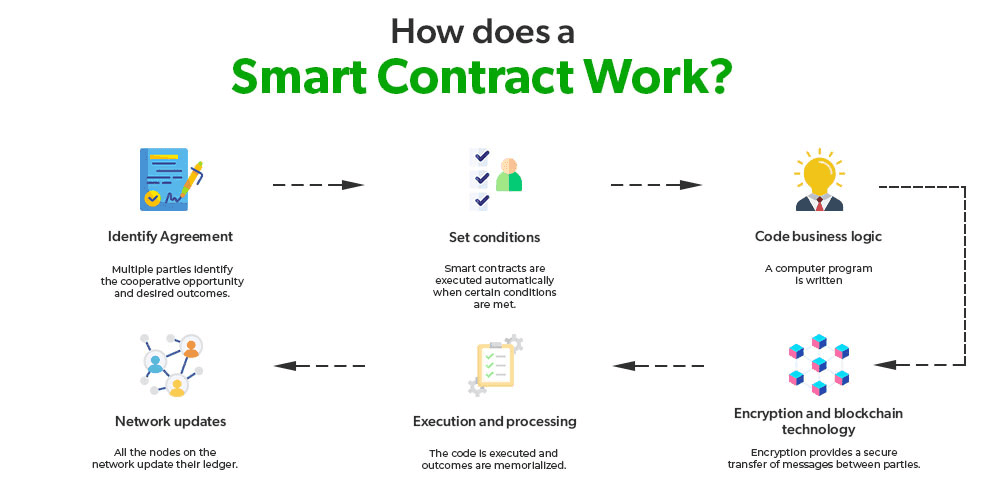
(3) Tokens
Digital Items and Currency
In the realm of online video games, digital currencies and items play a pivotal role, obtained through defeating adversaries, completing quests, engaging in gameplay, or even purchasing them for cosmetic enhancements. Blockchain tokens, whether fungible (akin to Runescape's "gp") or non-fungible (representing in-game items), serve analogous functions.
Traditionally, a game publisher manages the storage and distribution of in-game currencies and items through a proprietary backend server, dictating ownership and usage rights. However, blockchain games redefine the landscape.
In the realm of blockchain-powered games, in-game assets tied to blockchain tokens establish a groundbreaking paradigm for digital asset ownership. When an in-game item becomes a non-fungible token (NFT), the player unequivocally owns it. This ownership cannot be revoked or erased, empowering players to exercise rights over their possessions—be it selling, trading, or making purchases—without explicit approval from the game developer.
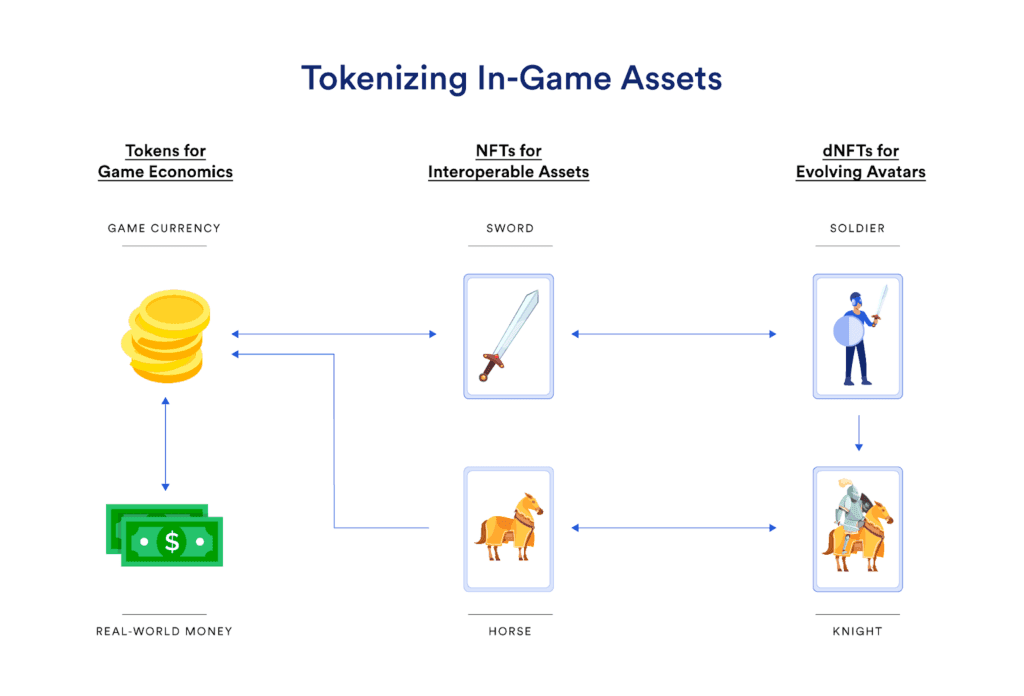
Critics argue that the intrinsic value of in-game blockchain tokens can still be undermined if game publishers render them functionally worthless. While this contention holds merit, the adoption of tokens as the standard within games fundamentally shifts the dynamics of digital ownership.
In the pre-blockchain era, ownership was a bestowed privilege, subject to the decisions and approvals of game publishers. Blockchain games, however, establish ownership as an inherent right, necessitating intentional revocation. This paradigm shift underscores the transformative nature of blockchain technology in reshaping the concept of digital ownership.
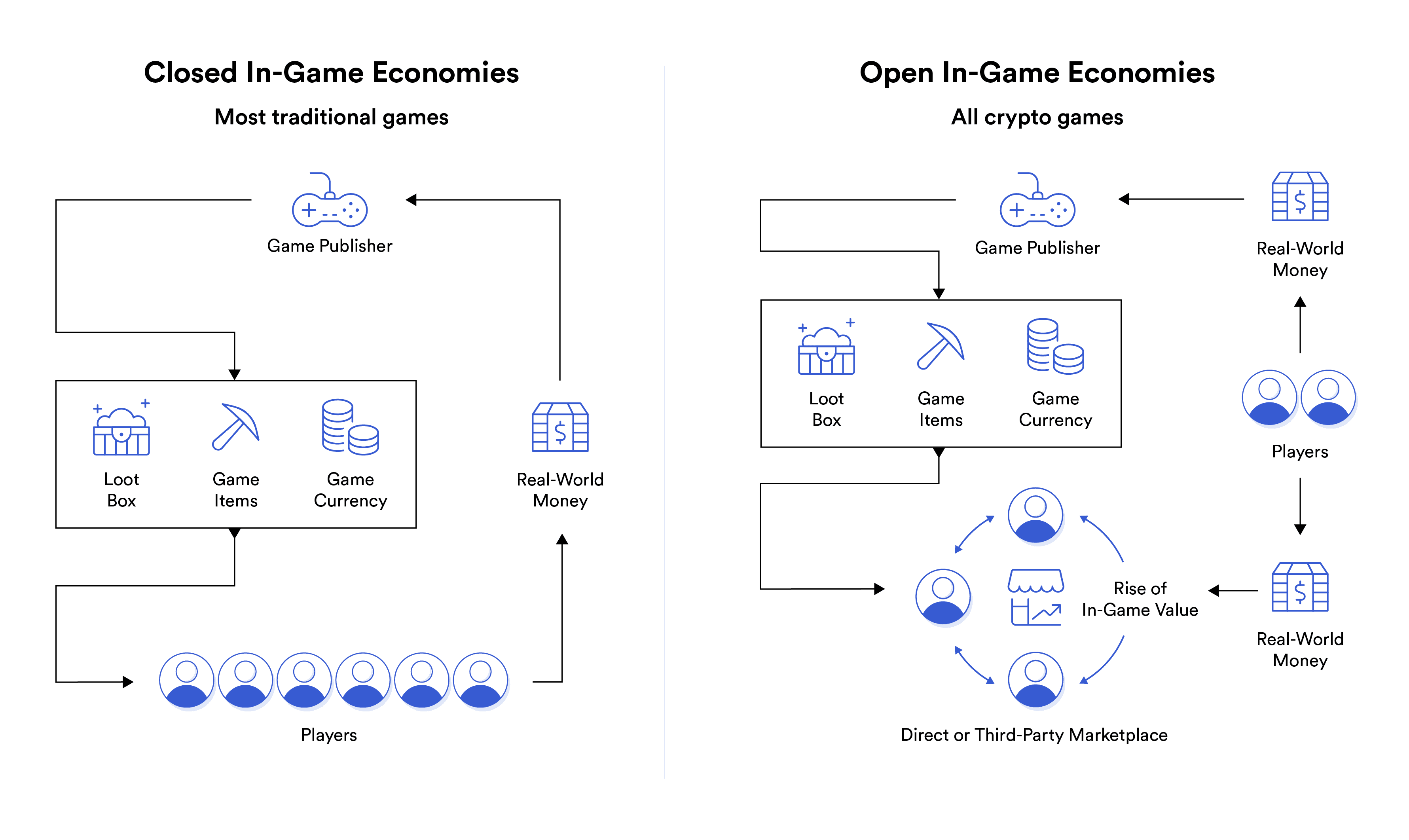
Player-Led Governance
Decentralized Autonomous Organizations (DAOs)
Tokens, beyond their role as in-game currencies, hold the potential to serve as a tool for orchestrating decentralized autonomous organizations (DAOs) and assigning membership and governance privileges to players.
The fundamental idea behind a DAO token, irrespective of its specific implementation, can be distilled into three key components:
- Token Distribution: Tokens are allocated to players based on diverse criteria, encompassing various in-game achievements or metrics showcasing a player's commitment, such as completing events or spending a designated amount of time within the game.
- Voting Weight: Each token is assigned a specific voting weight, determining its influence in decision-making. This could be a one-vote-per-token system, a one-vote-per-player arrangement, or an alternative governance structure, effectively utilizing tokens as a medium for players to express their preferences.
- Proposal Voting: Tokens are utilized for voting on proposals, with customizable parameters regarding the scope of proposed changes and the participants allowed to suggest or vote on specific matters.
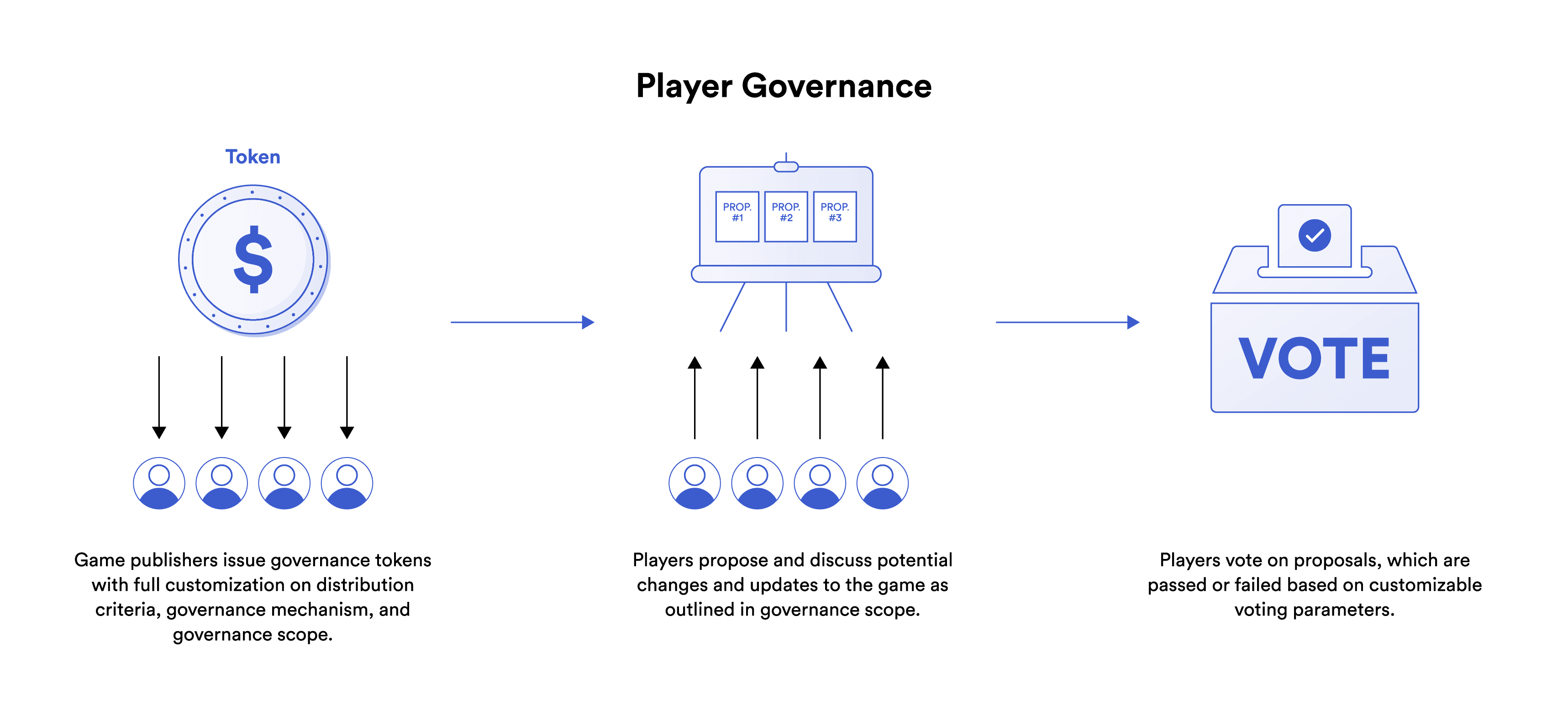
Token-based voting provides players with the authority to influence the game's trajectory, serving as a potent tool to foster player engagement, guide appropriate game design choices, and delegate certain aspects of game development. The central challenge in implementing DAO tokens lies in striking a balance between maximizing efficiency in game development, ensuring a coherent creative direction, and allowing full-fledged player participation.
For instance, a collective player's vote on intricate aspects like gameplay balance in multiplayer online games may prove impractical, as these decisions are better handled by specialized game analysts and developers with profound insights into the game's dynamics. However, for more cosmetic decisions like skin designs, a decentralized approach involving players in proposing and voting on concepts can be both viable and beneficial, ensuring alignment with player preferences.
Final Thoughts
Blockchain technology offers game publishers the opportunity to empower players in shaping the outcomes of the games they love. The pillars of connectivity, ownership, and empowerment define the potential of blockchain technology and web3.
Blockchain games share the same fundamental purpose as any other game - to offer players unique and fulfilling experiences. With web3, the possibility of creating larger, more interconnected digital worlds arises, giving players sovereign ownership over their achievements and a meaningful role in shaping the games they invest time, dedication, and effort into.
This article was inspired by an original blog post from Chainlink, you can read the full post on their website here for more information.




